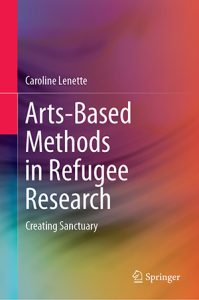Arts-Based Methods in Refugee Research: Creating Sanctuary

Author: Caroline Lenette
Publisher: Springer Singapore
Year of Publication: 2019
Print Length: 240 pages
Genre: Academic / Methodology & Methods, Non-Fiction / Social Science, Arts & Humanities
Topic: Arts-Based Method, Sanctuary, Research, Research Methods, Bottom-Up Research, Ethics & Morality, Refugees & Forced Migration, Asylum & Asylum Seekers, Community Music, Participatory Video, Photography, Visual, Storytelling, Decolonization & Anti-Colonization, Change, Collaboration & Participation, Community, Social Justice, Solidarity, Politics & Power, Policy & Practice
Drawn from a decade of refugee studies, this book offers a wealth of insights on arts-based methodologies. It explores exciting new prospects for participatory and culturally safe research, and will be a reference resource for researchers of all levels and community practitioners.
The book tackles questions of meaningful research practice: How do people with lived experiences of forced migration—Knowledge Holders—lead the way? Can arts-based methods bring about policy and social change? And what of ethical issues?
By reflecting on the strengths and limitations of four research methods (digital storytelling, photography, community music, and participatory video), readers are invited to craft their own approach to arts-based projects.
Table of Contents
Foreword
Preface
PART I: CONTEXT
1. Social Context
Introduction / Refugee Studies / Gender Perspectives / Words and Labels / Positionality and Key Approaches / Who Is This Book For?: Book Structure, About Me / Summary / Questions for Discussion / References
2. Why Arts-Based Research?
Introduction: How Are Arts-Based Methods Used? / Aims of Arts-Based Methods / The Value of Arts-Based Research / Key Tensions / Relevance to Refugee Studies / Alternative Storytelling: Practice-Research Nexus, Collaborations with Arts Organisations / Visual Ethnography as Co-creative Research / Summary / Questions for Discussion / References
3. Policy Change
Introduction / Policy Change Through Arts-Based Policy: Arts and Health Policy / Arts-Based Research Outcomes and Policy Change: Theatre and Drama / Policy Change in Refugee Studies / Political Listening / Knowledge Translation / Deliberative Dialogue: What Can We Do Differently? / Summary / Questions for Discussion / References
4. Ethics
Introduction / Decolonising Research / Ethical Issues in Refugee Research: Reciprocity, ‘New’ Power Differentials, Assumptions of ‘Vulnerability’ and ‘Anonymity’ / Ethics and Arts-Based Methods: Engagement, Data Collection and Analysis, Interpretation and Dissemination / Ethics Approval Process / Dominance of Positivist Paradigm: Impact on Arts-Based Researchers, What Can Researchers Do to Address This Situation?, What of Ethics Board?, How Should Knowledge Holders Be Involved? / Summary / Questions for Discussion / References
PART II: METHODS
5. Digital Storytelling
Introduction / Storytelling via Digital Means / The Value of Digital Storytelling / Digital Storytelling as a Transformative Process / Script Writing / Issues and Tensions / Summary / Questions for Discussions / References
6. Photography
Introduction / Photographs / The Value of Photo-Voice: Key Strengths of Photo-Voice, Photo-Voice and Refugee Research, Photo-Elicitation / Photo-Voice as a Transformative Process / Challenging the ‘Chronic Voyeuristic Relation’ / Issues and Tensions / Summary / Questions for Discussion / References
7. Community Music
Introduction / The Value of Community Music: Relevance to Refugee Studies, Music and Wellbeing / Community Music as a Transformative Process: Political Acts of Resistance / Lyrics / Issues and Tensions / Summary / Questions for Discussion / References
8. Participatory Video
Introduction / The Value of Participatory Video: Relevance to Refugee Studies / Participatory Video as a Transformative Process / Representation, Recognition and Response / Issues and Tensions / Summary / Questions for Discussion / References
9. Sanctuary
Introduction / Creating a Sense of Sanctuary / The Danger of a Single Story / Reflection / References

Caroline Lenette is Associate Professor, School of Social Sciences and Deputy Director of the Big Anxiety Research Centre at UNSW Sydney. She is a leading interdisciplinary researcher focusing on participatory methods and social justice informed research especially with refugee-background co-researchers. Her scholarship centres on how co-research through creative and artistic means can influence decision-makers and policymaking towards meaningful change. Caroline explores how ethics in research practice is conceptualised in participatory research. She has a passion for arts-health research. Caroline is the author of Arts-based methods in refugee research: Creating sanctuary (2019, Springer) and Participatory Action Research: Ethics and Decolonization (Oxford University Press, 2022).
Source: https://www.unsw.edu.au/staff/caroline-lenette
More from Caroline Lenette in this library, click here.
